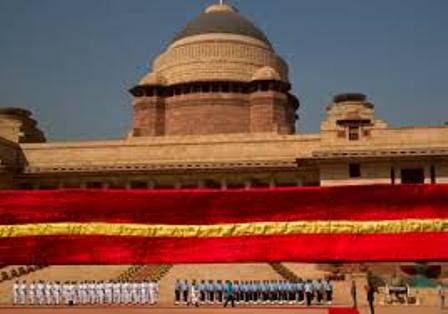Rashtrapati Bhavan’s Durbar Hall and Ashok Hall renamed to ‘remove traces of anglicisation’

NEW DELHI, JULY 25 : President Droupadi Murmu has announced the renaming of two significant halls within Rashtrapati Bhavan, marking a symbolic shift towards embracing Indian cultural values and ethos. The historically renowned ‘Durbar Hall’ and ‘Ashok Hall’ will now be known as ‘Ganatantra Mandap’ and ‘Ashok Mandap,’ respectively.
“Rashtrapati Bhavan, the office and the residence of the President of India, is a symbol of the nation, and an invaluable heritage of the people. Continuous efforts are being made to make it more accessible to people. There has been a consistent endeavour to make the ambience of the Rashtrapati Bhavan reflective of Indian cultural values and ethos,” the Rashtrapati Bhavan said in a release.
“Accordingly, President Droupadi Murmu is pleased to rename two of the important halls of Rashtrapati Bhavan – namely, ‘Durbar Hall’ and ‘Ashok Hall’ – as ‘Ganatantra Mandap’ and ‘Ashok Mandap’ respectively,” it added.
This recent decision to rename the halls is part of an effort by the BJP government to move away from colonial legacies and better reflect India’s cultural heritage. The new names aim to emphasise the nation’s traditional values.
The press statement from Rashtrapathi Bhavan explained that the term ‘Durbar’ originally referred to the courts of Indian rulers and the British Raj. It noted that the term lost its relevance after India became a republic.
“‘Durbar Hall’ is the venue of important ceremonies and celebrations such as the presentation of National Awards. The term ‘Durbar’ refers to courts and assemblies of Indian rulers and the British. It lost relevance after India became a Republic, that is, ‘Ganatantra’. The concept of ‘Ganatantra’ is deeply rooted in Indian society since the ancient times, making ‘Ganatantra Mandap’ an apt name for the venue.,” it said.
The statement said that Ashok Hall used to be a ballroom. The remaining of the hall removed the traces of anglicisation, it said.
“Ashok Hall” was originally a ballroom. The word ‘Ashok’ connotes someone who is “free from all sufferings” or is “bereft of any sorrow”. Also, ‘Ashoka’ refers to Emperor Ashok, a symbol of unity and peaceful co-existence. The National Emblem of the Republic of India is the lion capital of Ashok from Sarnath. The word also refers to the Ashok tree which has deep significance in Indian religious traditions as well as arts and culture. Renaming ‘Ashok Hall’ as ‘Ashok Mandap’ brings uniformity in language and removes the traces of anglicisation while upholding the key values associated with the word ‘Ashok’,” the statement adds.
-PTI






